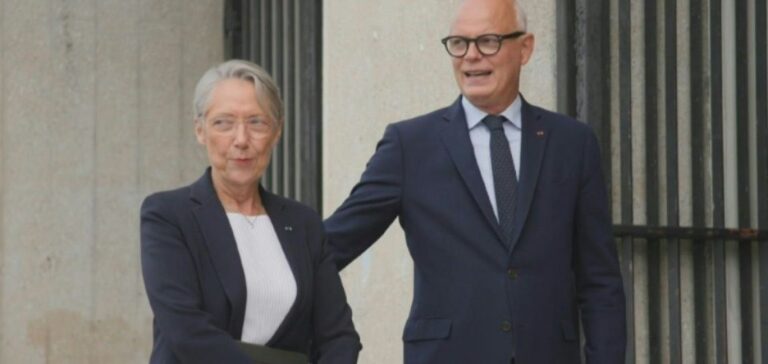Élisabeth Borne met her predecessor Édouard Philippe, the city’s mayor and president of the allied Horizons party, in Le Havre on Tuesday, with whom she expressed her wish to “develop the green industry from Le Havre to Paris”, presenting two alternative fuel projects planned for the port.
Engie invests 1.2 billion euros in Le Havre for green fuels
Accompanied by six ministers, including Sylvie Retailleau (Research), Agnès Pannier-Runacher (Energy), and Christophe Béchu (Ecological Transition), the Prime Minister toured the port of Le Havre with him on board a boat, after receiving a “fast walk” sweatshirt from the city’s former head of government.
“We want to take full advantage of this port complex (named Haropa, the merger of the ports of Le Havre, Rouen and Paris, ed. note) to develop the green industry from Le Havre to Paris” and also “further strengthen (its) place as a gateway to Europe”, she stressed at a press briefing.
High black fumes were visible from the ship, produced by the burning of tires by dockworkers on the quayside.
“It’s their little word of welcome,” quipped Édouard Philippe.
Energy group Engie plans to set up two alternative fuel projects at the port of Le Havre, Salamandre and KerEAUzen, to accelerate the decarbonization of sea and air transport, for a total investment of 1.2 billion euros. Their construction will initially generate 5,000 jobs, then their operational management between 150 and 200, said Engie CEO Catherine MacGregor, who was also on the trip.
Towards a greener future: Engie innovates with sustainable fuels
Starting in 2027, the Salamandre project will supply 11,000 tonnes a year of 2nd generation bio-methane to meet the needs of the shipping company CMA CGM, in a sector seeking to move away from fuel oil and fossil gas. The other, larger project, France KerEAUzen, is valued at 1 billion euros and, following a feasibility study, should be able to supply 70,000 tonnes a year of e-kerosene (low-carbon synthetic fuel) from 2030, mainly for the needs of Air France.
This fuel will be made from a combination of renewable, low-carbon hydrogen produced by an electrolysis unit, and recycled CO2, estimated at 270,000 tonnes.
However, “part of this CO2, i.e. 60,000 tonnes, will be recovered from Salamandre’s facilities”, with the remainder supplied by local manufacturers, explained Sébastien Arbola, Deputy Managing Director of Engie, to AFP, emphasizing the “complementary nature” of the two projects.
Back on land, the Prime Minister and MP for Calvados praised “the most beautiful region of France” to a few passers-by, after posing for a photo in front of a restaurant named “Babette” and before chatting with a young nurse who was complaining about his working conditions.
When they returned to the town hall, the two officials were greeted by boos. And a few dozen demonstrators brandishing CGT or NPA flags. “Out with the government,” shouted one woman. Élisabeth Borne has yet to announce a total budget of 23 million euros. For the three universities in Normandy, winners of a call for excellence projects as part of France 2030.






















